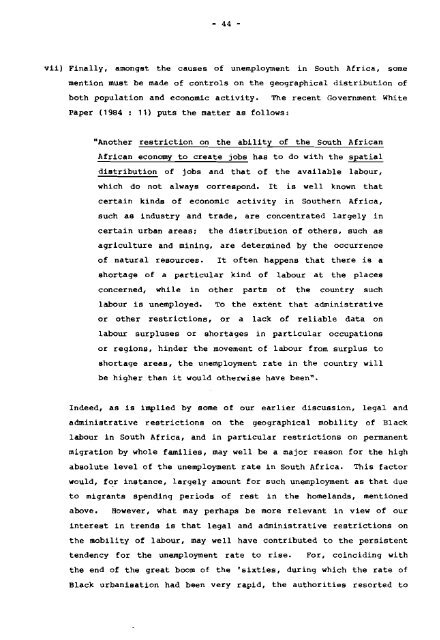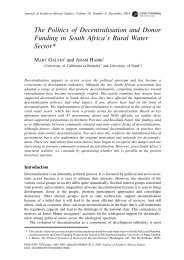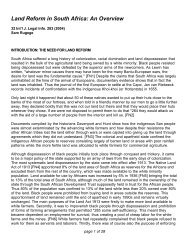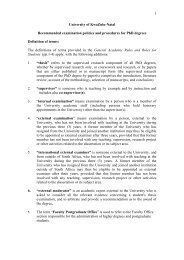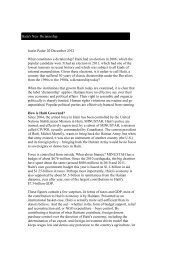Bell, Trevor : Unemployment in South Africa
Bell, Trevor : Unemployment in South Africa
Bell, Trevor : Unemployment in South Africa
Create successful ePaper yourself
Turn your PDF publications into a flip-book with our unique Google optimized e-Paper software.
vii) F<strong>in</strong>ally, amongst the causes of unemployment <strong>in</strong> <strong>South</strong> <strong>Africa</strong>, some<br />
mention must be made of controls on the geographical distribution of<br />
both population and economic activity. The recent Government White<br />
Paper (1984 : 11) puts the matter as follows:<br />
"Another restriction on the ability of the <strong>South</strong> <strong>Africa</strong>n<br />
<strong>Africa</strong>n economy to create jobs has to do with the spatial<br />
distribution of jobs and that of the available labour,<br />
which do not always correspond. It is well known that<br />
certa<strong>in</strong> k<strong>in</strong>ds of economic activity <strong>in</strong> <strong>South</strong>ern <strong>Africa</strong>,<br />
such as <strong>in</strong>dustry and trade, are concentrated largely <strong>in</strong><br />
certa<strong>in</strong> urban areas; the distribution of others, such as<br />
agriculture and m<strong>in</strong><strong>in</strong>g, are determ<strong>in</strong>ed by the occurrence<br />
of natural resources. It often happens that there is a<br />
shortage of a particular k<strong>in</strong>d of labour at the places<br />
concerned, while <strong>in</strong> other parts of the country such<br />
labour is unemployed. To the extent that adm<strong>in</strong>istrative<br />
or other restrictions, or a lack of reliable data on<br />
labour surpluses or shortages <strong>in</strong> particular occupations<br />
or regions, h<strong>in</strong>der the movement of labour from surplus to<br />
shortage areas, the unemployment rate <strong>in</strong> the country will<br />
be higher than it would otherwise have been".<br />
Indeed, as is implied by some of our earlier discussion, legal and<br />
adm<strong>in</strong>istrative restrictions on the geographical mobility of Black<br />
labour <strong>in</strong> <strong>South</strong> <strong>Africa</strong>, and <strong>in</strong> particular restrictions on permanent<br />
migration by whole families, may well be a major reason for the high<br />
absolute level of the unemployment rate <strong>in</strong> <strong>South</strong> <strong>Africa</strong>. This factor<br />
would, fqr <strong>in</strong>stance, largely amount for such unemployment as that due<br />
to migrants spend<strong>in</strong>g periods of rest <strong>in</strong> the homelands, mentioned<br />
above. However, what may perhaps be more relevant <strong>in</strong> view of our<br />
<strong>in</strong>terest <strong>in</strong> trends is that legal and adm<strong>in</strong>istrative restrictions on<br />
the nobility of labour, may well have contributed to the persistent<br />
tendency for the unemployment rate to rise. For, co<strong>in</strong>cid<strong>in</strong>g with<br />
the end of the great boom of the 'sixties, dur<strong>in</strong>g which the rate of<br />
Black urbanisation had been very rapid, the authorities resorted to


